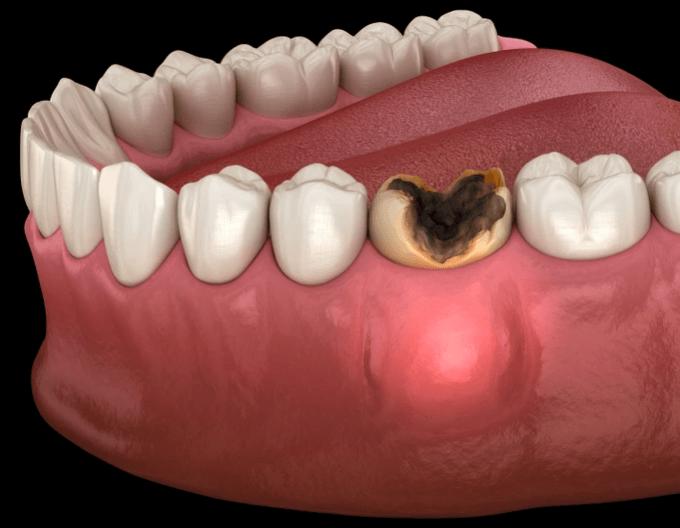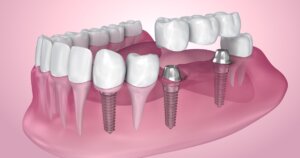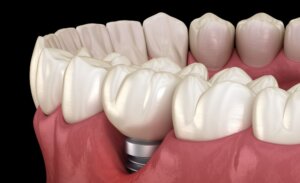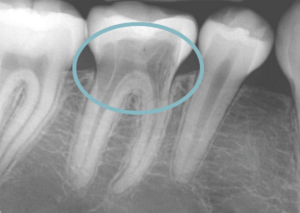Antibiotic Prescription For Dental Infection

What Are Antibiotics For Dental Infection?
When it comes to your oral health, there are instances where dental infections can become a cause for concern. These infections can range from a painful toothache to more severe conditions like abscesses or periodontal disease. In such cases, your dentist might recommend an antibiotic prescription as part of your treatment plan.
Antibiotics are a class of powerful medications used to treat bacterial infections by killing or inhibiting the growth of these single-celled microorganisms that can cause various illnesses and diseases. Antibiotics are a critical tool in modern medicine. They are prescribed by healthcare professionals like doctors and dentists, who determine the appropriate antibiotic based on the type of infection, its severity, and the patient’s medical history. It’s important to use antibiotics as prescribed, following the recommended dosage and completing the full course of treatment to ensure that the infection is effectively eradicated and to minimize the risk of antibiotic resistance.
Before deciding on whether an Antibiotic Prescription is right for your tooth infection, there are some things you should know:
- What Are The Different Types Of Antibiotics?
- What Are The Indications For Antibiotic Prescription?
- What Are The Contraindications For Antibiotic Prescription?
- What Are The Alternative Treatments If I Do Not Choose An Antibiotic Prescription?
- How Do I Get An Antibiotic Prescription For Dental Infection?
- Can I Have Antibiotic Prescription For Dental Infection If I Am Pregnant?
- How Long Does A Course of Antibiotics Last?
- What Are Common Problems With Antibiotics?
If you are interested in obtaining an Antibiotic Prescription For Dental Infection, please schedule a complimentary phone consultation with our dentist or contact us.

Free phone consultation
Have questions about antibiotic prescriptions for a dental infection? Schedule a free phone consultation with our Toronto dentist.

5 star google reviews
Our patients love us! See for yourself why people are choosing Atlas Dental in Toronto for antibiotic prescriptions.

Emergency Dental Visit
Do you have a tooth ache or dental infection and want to see a Toronto dentist? Book an emergency appointment today.
What Are The Different Types Of Antibiotics?
When it comes to dental infections, various antibiotics are commonly prescribed by dentists to combat bacterial invaders and promote healing. Here are some of the frequently prescribed antibiotics for dental infections:
- Amoxicillin: Amoxicillin is a widely used antibiotic for dental infections. It is effective against a broad spectrum of oral bacteria and is often the first choice for treating dental abscesses, gum infections, and tooth infections.
- Cephalexin: Cephalexin is another antibiotic used to treat dental infections. It belongs to the cephalosporin class of antibiotics and is effective against a range of bacteria commonly found in the oral cavity.
- Clindamycin: Clindamycin is a powerful antibiotic used to treat severe dental infections, particularly when they are caused by anaerobic bacteria that are resistant to other antibiotics. Dentists may prescribe clindamycin in cases of complicated dental abscesses or certain types of periodontal disease.
- Azithromycin: Azithromycin is an alternative for patients with allergies to penicillin. It is occasionally used to manage dental infections, although it is not the first-line choice.
- Metronidazole: Metronidazole is often used alongside other antibiotics to target anaerobic bacteria and is commonly prescribed for the treatment of certain types of periodontal disease.
These antibiotics are selected based on the type and severity of the dental infection, the patient’s medical history, and any known allergies or contraindications. It’s crucial to follow the prescribed antibiotic regimen precisely as directed by your dentist to ensure effective and safe treatment. In many cases, your dentist may recommend additional dental procedures, such as tooth extraction or root canal therapy, to address the underlying cause of the infection. If you are interested in obtaining an Antibiotic Prescription For Dental Infection, please schedule a complimentary phone consultation with our dentist or contact us.

What Are The Indications For Antibiotic Prescription?
Prescribing antibiotics for dental infections is not a decision to be taken lightly. Dentists carefully evaluate each case to determine whether antibiotics are necessary. Here are the common indications for antibiotic prescription for dental infections:
- Severe Dental Infections: Antibiotics are typically recommended when a dental infection is severe and poses a risk of spreading to other parts of the body. This is often the case with dental abscesses, which can be extremely painful and require prompt treatment. If the infection is left untreated, it can potentially spread to the bloodstream and affect other organs, leading to serious complications.
- Persistent Infections: If a dental infection does not respond to initial treatment, or if it keeps coming back despite dental procedures, additional antibiotics may be considered. This can occur with chronic or recurrent gum infections or tooth abscesses.
- Systemic Symptoms: Systemic symptoms, such as fever and swollen lymph nodes, may indicate a spreading infection. In such cases, antibiotics can help control the infection and alleviate these symptoms.
- Immune System Compromises: Individuals with compromised immune systems, such as those with HIV/AIDS or undergoing chemotherapy, are at higher risk for infections. Dentists may prescribe antibiotics more readily for these patients to prevent and treat dental infections.
- Pre-operative and Post-operative Prophylaxis: Before certain dental procedures, like extractions or surgeries, dentists may prescribe antibiotics as a preventive measure to reduce the risk of infection. Post-operative antibiotics may also be recommended to prevent or manage infection following the procedure.
- Endocarditis Prophylaxis: For individuals with specific heart conditions, such as certain congenital heart defects, dentists may prescribe antibiotics before dental procedures to reduce the risk of infective endocarditis, a rare but serious heart infection.
It’s crucial to understand that not all dental infections require antibiotics. Dentists follow strict guidelines and consider each patient’s individual circumstances before making the decision to prescribe these medications. Using antibiotics judiciously helps prevent the development of antibiotic resistance, which can make future infections more challenging to treat. If you are interested in obtaining an Antibiotic Prescription For Dental Infection, please schedule a complimentary phone consultation with our dentist or contact us.

What Are The Contraindications For Antibiotic Prescription?
While antibiotics can be a crucial part of treating dental infection, there are specific situations where their use may not be recommended, or alternative approaches may be considered. Here are some common contraindications for antibiotic prescription for dental infections:
- Allergies: If you are allergic to a particular antibiotic, it is a contraindication for its use. For instance, if you have a known allergy to penicillin and amoxicillin, your dentist will consider alternative antibiotics like clindamycin to avoid an allergic reaction.
- Overuse or Misuse: The overuse or misuse of antibiotics has led to a global health concern known as antibiotic resistance. In cases where antibiotics are not clearly indicated, or when an infection is not bacterial (e.g., it’s caused by a virus), dentists may avoid prescribing antibiotics to prevent contributing to antibiotic resistance.
- Low Risk of Complications: For minor dental infections or conditions with a low risk of complications, dentists may opt for non-antibiotic treatment methods, such as dental procedures or pain management, without prescribing antibiotics. This helps prevent unnecessary antibiotic exposure.
- Non-Bacterial Infections: Antibiotics are effective against bacterial infections, not viral infections. Conditions like cold sores or most cases of viral stomatitis do not respond to antibiotics. Dentists will only prescribe antibiotics when there is a bacterial component to the infection.
- Pregnancy and Breastfeeding: During pregnancy or while breastfeeding, the use of antibiotics may require careful consideration due to potential effects on the developing fetus or the nursing infant. Dentists will weigh the risks and benefits in these cases.
It’s important to communicate openly with your dentist about any allergies, medical conditions, medications you are taking, or changes in your health status. This information helps your dentist make informed decisions regarding the use of antibiotics for your dental infection. If you are interested in obtaining an Antibiotic Prescription For Dental Infection, please schedule a complimentary phone consultation with our dentist or contact us.
What Are The Alternative Treatments If I Do Not Choose An Antibiotic Prescription?
In some cases, you may choose not to go with antibiotic prescription for a dental infection, or your dentist may determine that antibiotics are not necessary based on the specific circumstances. Here are alternative treatments and approaches to manage dental infections effectively:
- Dental Procedures: In many cases, the most effective way to address a dental infection is through appropriate dental treatment. Your dentist may recommend:
- Tooth Extraction: If a tooth is severely infected and cannot be saved, your dentist may recommend extracting it to remove the source of the infection.
- Root Canal Therapy: For infections within the pulp of a tooth, a root canal procedure can effectively treat the infection and save the tooth.
- Abscess Drainage: If you have a dental abscess, your dentist may drain the abscess to relieve pain and promote healing.
- Periodontal Treatment: For gum infections, periodontal treatment, such as scaling and root planing, may be necessary to remove infection-causing plaque and calculus.
- Pain Management: Dental infections can be extremely painful. Over-the-counter pain relievers, such as ibuprofen or acetaminophen, can help manage discomfort while your body’s immune system works to combat the infection. Be sure to follow the recommended dosage instructions.
- Warm Salt Water Rinses: Rinsing your mouth with warm salt water can help alleviate pain and reduce inflammation in the affected area. Mix a half-teaspoon of salt in a glass of warm water, swish it around your mouth for 30 seconds, and then spit it out.
- Good Oral Hygiene: Practicing good oral hygiene is essential to prevent and manage dental infections. Regular brushing, flossing, and using an antiseptic mouthwash can help maintain oral health and reduce the risk of infections.
It’s crucial to discuss alternative treatment options with your dentist to determine the most appropriate course of action for your specific dental infection. Dentists consider the severity of the infection, your overall health, and any contraindications when making these recommendations. If you are interested in obtaining an Antibiotic Prescription For Dental Infection, please schedule a complimentary phone consultation with our dentist or contact us.

How Do I Get An Antibiotic Prescription For Dental Infection?
The process of antibiotic prescription for a dental infection involves several important steps to ensure that the medication is used effectively and safely. Here are the key steps in the antibiotic prescription procedure for dental infections:
- Dental Examination: The first and most crucial step is a thorough dental examination by a licensed dentist. During this examination, the dentist will assess the nature and severity of your dental infection. They will also consider your medical history, allergies, and any contraindications for antibiotics. This examination helps the dentist make an informed decision about whether antibiotics are necessary.
- Diagnosis: Based on the examination findings, the dentist will diagnose the type of dental infection you have. This could be a dental abscess, gum infection, tooth infection, or another specific condition. The diagnosis is critical in determining the most appropriate treatment, which may or may not include antibiotics.
- Antibiotic Selection: If antibiotics are indicated, the dentist will choose the appropriate antibiotic based on the type of infection, its severity, and any known allergies or contraindications. Common antibiotics for dental infections include amoxicillin clindamycin, azithromycin, and others, as discussed earlier.
- Prescription: The dentist will write a prescription for the selected antibiotic, specifying the medication, dosage, and duration of treatment. It’s essential to follow these instructions precisely and take the full course of antibiotics, even if your symptoms improve before you’ve finished the medication.
- Monitoring: Before leaving the dental office, you should receive clear instructions on how to take the prescribed antibiotics. As you take the antibiotics, you should be aware of any potential side effects and report them to your dentist if they occur. Your dentist may want to schedule a follow-up appointment to monitor your progress and ensure the infection is responding to treatment.
- Dental Treatment: In some cases, the use of antibiotics may be combined with dental procedures to address the root cause of the infection. The dentist will discuss any necessary dental treatments, such as tooth extraction, root canal therapy, or abscess drainage.
- Follow-up Care: Once the antibiotic treatment is completed, your dentist may recommend additional follow-up care to ensure that the infection has been fully resolved. This may include dental check-ups and preventive measures to avoid future infections.
Remember that antibiotics are prescribed for a specific purpose and should not be used for conditions that do not require them. It’s important to work closely with your dentist and follow their guidance throughout the antibiotic prescription procedure to ensure the most effective and safe treatment for your dental infection. If you are interested in obtaining an Antibiotic Prescription For Dental Infection, please schedule a complimentary phone consultation with our dentist or contact us.
Can I Have Antibiotic Prescription For Dental Infection If I Am Pregnant?
If you are pregnant and experiencing a dental infection, it’s essential to prioritize both your dental health and the well-being of your developing baby. Dental infections can pose risks during pregnancy, as they may lead to systemic health issues if left untreated. However, antibiotic use during pregnancy should be approached with caution. Here are some important considerations:
- Safest Antibiotic for Pregnant Women: In general, the safest antibiotic for pregnant women is amoxicillin. Amoxicillin is a type of penicillin antibiotic that is commonly used to treat dental infections. It is considered safe during pregnancy because it has been used for many years without significant evidence of harm to the developing fetus.
- Risks of Untreated Dental Infections: Dental infections, if left untreated, can lead to complications that may affect both your oral health and pregnancy. Severe dental infections, such as dental abscesses, can spread to other parts of the body and potentially lead to systemic infections. This is why it’s crucial to address dental infections during pregnancy.
- Dentist’s Evaluation: If you are pregnant and have a dental infection, it is recommended to consult your dentist promptly. Your dentist will perform a thorough evaluation to assess the severity of the infection, taking into account your pregnancy and any contraindications for antibiotic use. In some cases, your dentist may recommend dental procedures, such as tooth extraction, abscess drainage, or root canal therapy, as alternatives to antibiotics to manage the infection. These procedures can effectively treat the dental issue without the need for antibiotics.
- Antibiotic Use: If the infection is severe and requires antibiotics, your dentist may consider prescribing amoxicillin or another safe antibiotic, taking into account the specific details of your pregnancy. The dentist will provide you with clear instructions on how to take the medication, including dosage and duration. Your dentist will weigh the risks of the untreated dental infection against the potential risks associated with antibiotic use during pregnancy. In most cases, the benefit of treating the infection will outweigh the minimal risk of using amoxicillin or another safe antibiotic.
It’s essential to maintain open communication with your healthcare providers, including your dentist and obstetrician, to ensure coordinated care during your pregnancy. Your healthcare team can work together to determine the most appropriate treatment plan for your dental infection that prioritizes your health and the well-being of your baby. If you are interested in obtaining an Antibiotic Prescription For Dental Infection, please schedule a complimentary phone consultation with our dentist or contact us.

How Long Does A Course of Antibiotics Last?
A typical course of antibiotics for a dental infection commonly lasts for approximately 7 days. However, the specific duration may be adjusted based on the type and severity of the infection, the response to treatment, and individual health factors. It’s essential to follow your dentist’s instructions regarding the antibiotic course to ensure effective and safe treatment. Always complete the full course of antibiotics as prescribed to prevent antibiotic resistance and ensure the infection is completely resolved. If you are interested in obtaining an Antibiotic Prescription For Dental Infection, please schedule a complimentary phone consultation with our dentist or contact us.
What Are Common Problems With Antibiotics?
While antibiotics are a valuable tool in the treatment of dental infections, there can be some common problems associated with their prescription and use. Understanding these issues is essential to ensure safe and effective treatment. Here are some common problems with antibiotic prescription for dental infection:
- Antibiotic Resistance: One of the most significant concerns is the development of antibiotic resistance. Overuse or improper use of antibiotics can lead to the emergence of antibiotic-resistant bacteria. This makes future infections more challenging to treat and poses a global health threat. To combat this problem, antibiotics should be used judiciously and only when necessary.
- Inappropriate Antibiotic Selection: Choosing the wrong antibiotic for a specific infection can result in treatment failure. Dentists should carefully select antibiotics based on the type of bacteria causing the infection and their sensitivity to the medication. Using an inappropriate antibiotic may not effectively clear the infection.
- Allergic Reactions: Some individuals may have allergies to certain antibiotics, such as penicillin or amoxicillin. Prescribing an antibiotic to which a patient is allergic can lead to severe allergic reactions. It’s essential to inform your dentist about any known allergies to ensure safe antibiotic selection.
- Side Effects: Antibiotics can have side effects, ranging from mild gastrointestinal symptoms to more severe reactions. Common side effects include nausea, diarrhea, and rash. Dentists should consider potential side effects when prescribing antibiotics and provide guidance on managing them.
- Incomplete Courses: Patients not completing the full course of antibiotics as prescribed can also contribute to antibiotic resistance. Stopping antibiotics prematurely may allow some bacteria to survive and develop resistance.
- Pregnancy Considerations: When prescribing antibiotics for dental infections during pregnancy, it’s essential to choose medications that are safe for the developing fetus. Amoxicillin is a commonly used and safe choice during pregnancy.
- Appropriate Follow-Up: After completing an antibiotic course, patients should have appropriate follow-up with their dentist to ensure the infection has been effectively treated and to address any ongoing concerns.
To mitigate these problems, it’s essential for patients and dentists to communicate openly and work together to make informed decisions regarding antibiotic prescription. Patients should provide their full medical history, including allergies and medications, and follow their dentist’s instructions precisely. Dentists, in turn, should carefully evaluate each case and select antibiotics judiciously, considering the potential risks and benefits for the patient. If you are interested in obtaining an Antibiotic Prescription For Dental Infection, please schedule a complimentary phone consultation with our dentist or contact us.
We also think you’ll like…

Nobel Dental Implants
Nobel Dental Implants What Are Nobel Dental Implants? Nobel Biocare is a renowned and globally recognized dental implant company that has played a pivotal role

Dental Implant Surgery Informed Consent
Dental Implant Surgery Informed Consent I have been informed and afforded the time to fully understand the purpose and the nature of the implant surgery

Dental Abscess
Dental Abscess What Is A Dental Abscess? A Dental Abscess often appears as a painful swelling in the gums, cheek, or area near an affected

Peri-Implantitis
What Is Peri-Implantitis? What Is Peri-Implantitis? Dental implants have become a popular and effective solution for replacing missing teeth. However, like any other dental treatment,

External Root Resorption
External Root Resorption What Is External Root Resorption? External root resorption occurs when the body’s own immune system attacks and breaks down the outer root

Dental Implant Bridge
Dental Implant Bridge What Is A Dental Implant Bridge? A dental implant bridge is a prosthetic device used to replace one or more missing teeth

